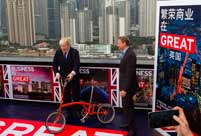The Beijing municipal government officially adopted an emergency program on Tuesday to respond to the capital city's heavy air pollution.
According to the Beijing Municipal Heavy Air Pollution Emergency Response Program, drivers in the city will only be allowed to use their cars every other day when a red alert, the highest warning level, is issued for air pollution.
Cars with odd- and even-numbered license plates will be allowed on roads on alternating days according to the program, which was adopted by the Standing Committee of the Beijing Municipal Committee of the Communist Party of China last Wednesday.
Meanwhile, 30 percent of municipal government cars will be banned from streets on an odd-even alternating basis.
Fang Li, deputy chief of the city's environmental protection bureau, said the bureau would try its best to issue warnings 24 hours before heavy air pollution days.
According to the Ministry of Environmental Protection, an air quality index (AQI) of over 300 is defined as "serious pollution" and an AQI between 201 and 300 is considered "heavy pollution."
Vehicles have been considered a major contributor to Beijing's heavy smog in recent years.
A research team from the Chinese Academy of Sciences estimated that vehicle exhaust fumes contribute 22.2 percent of PM 2.5 particles in the city, exceeding the figure for industrial emissions. PM 2.5 are airborne particles measuring less than 2.5 microns in diameter, which can pose health risks.
 Low wages Indian migrant laborers
Low wages Indian migrant laborers Five fighters in flight training
Five fighters in flight training London mayor hails free trade, subway system on China tour
London mayor hails free trade, subway system on China tour Different eye catching shows at housing fairs in China
Different eye catching shows at housing fairs in China Chalk it up to great courage
Chalk it up to great courage Tibetan girl helps mobilize volunteers onlin
Tibetan girl helps mobilize volunteers onlin Lingerie show dazzles Wuhan Motor Show 2013
Lingerie show dazzles Wuhan Motor Show 2013  Chinese screen goddesses from Beijing Film Academy
Chinese screen goddesses from Beijing Film Academy  Weekly Sports Photos
Weekly Sports Photos Chinese riot police take Liberia peacekeeping mission
Chinese riot police take Liberia peacekeeping mission World has never been dark-- a blind kid’s life in Tibet
World has never been dark-- a blind kid’s life in Tibet Change to law may make it easier to sue polluters
Change to law may make it easier to sue polluters UNESCO world heritage site: Montale Tower
UNESCO world heritage site: Montale Tower U.S. Senate leader announces bipartisan deal
U.S. Senate leader announces bipartisan deal Fiber-optic wedding dress show shinning in Suzhou
Fiber-optic wedding dress show shinning in Suzhou Day|Week|Month